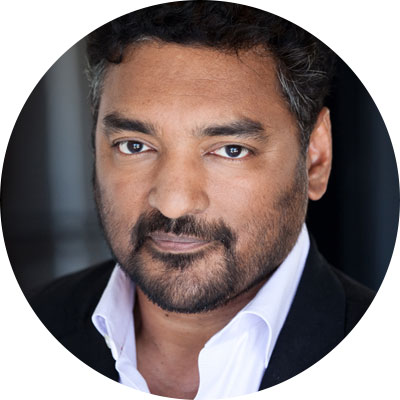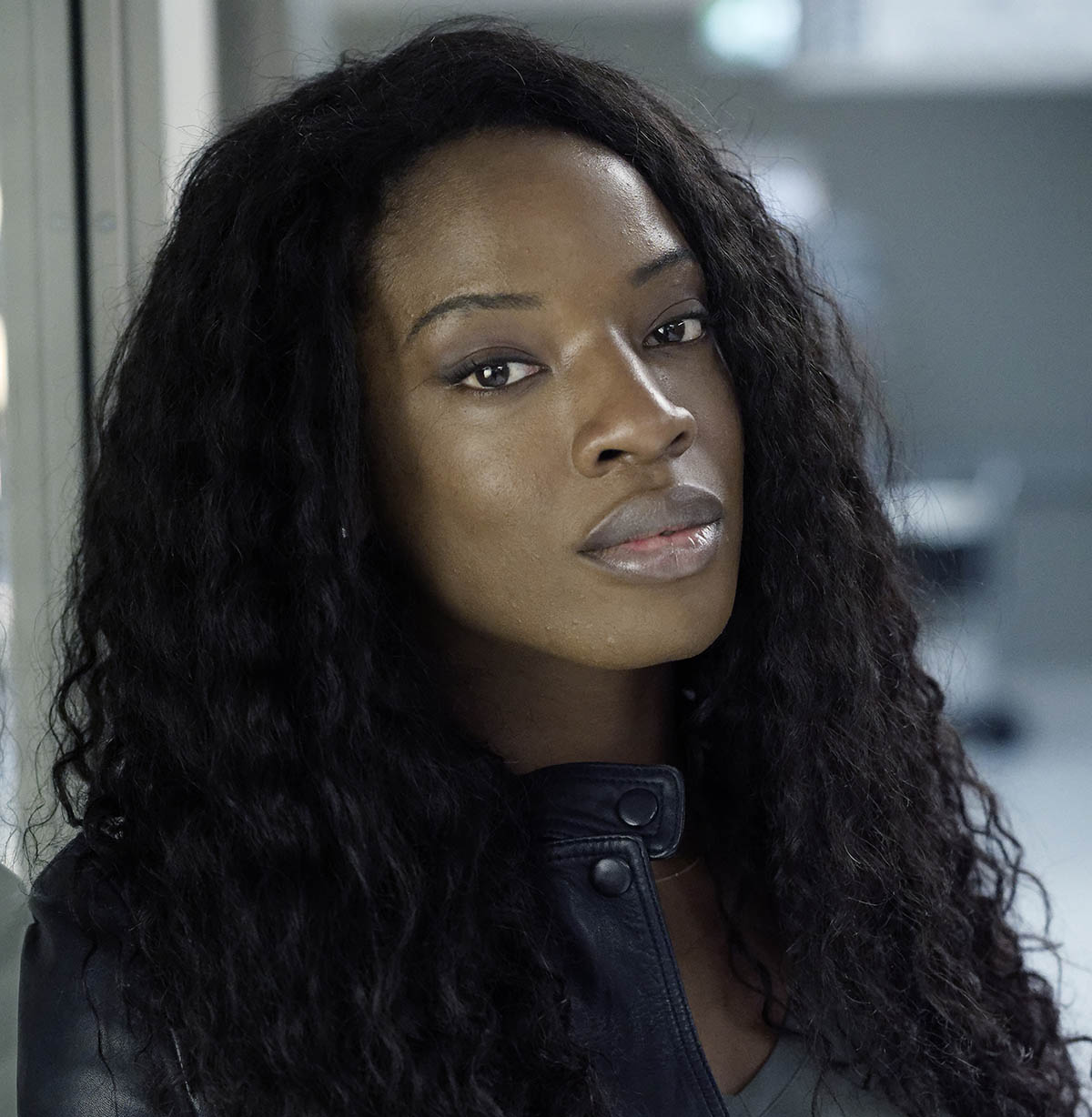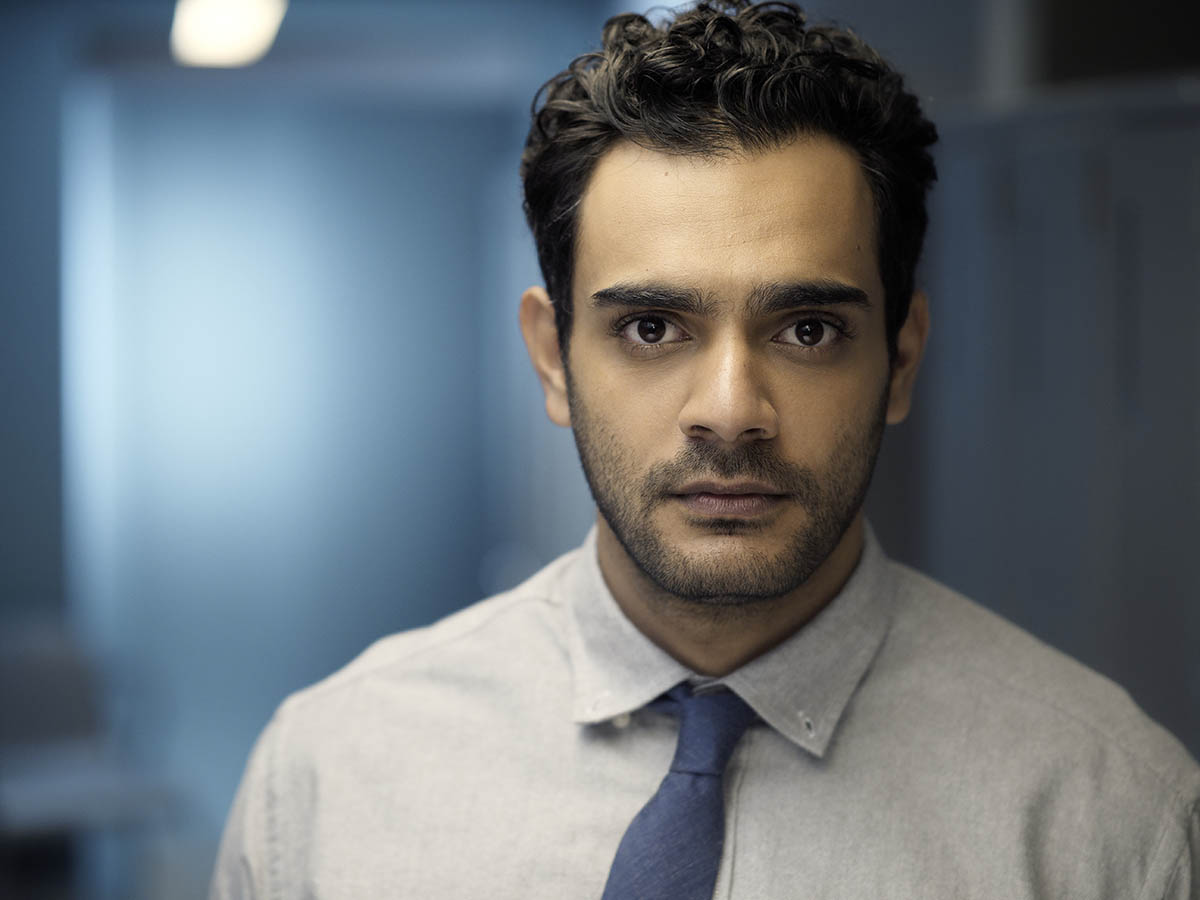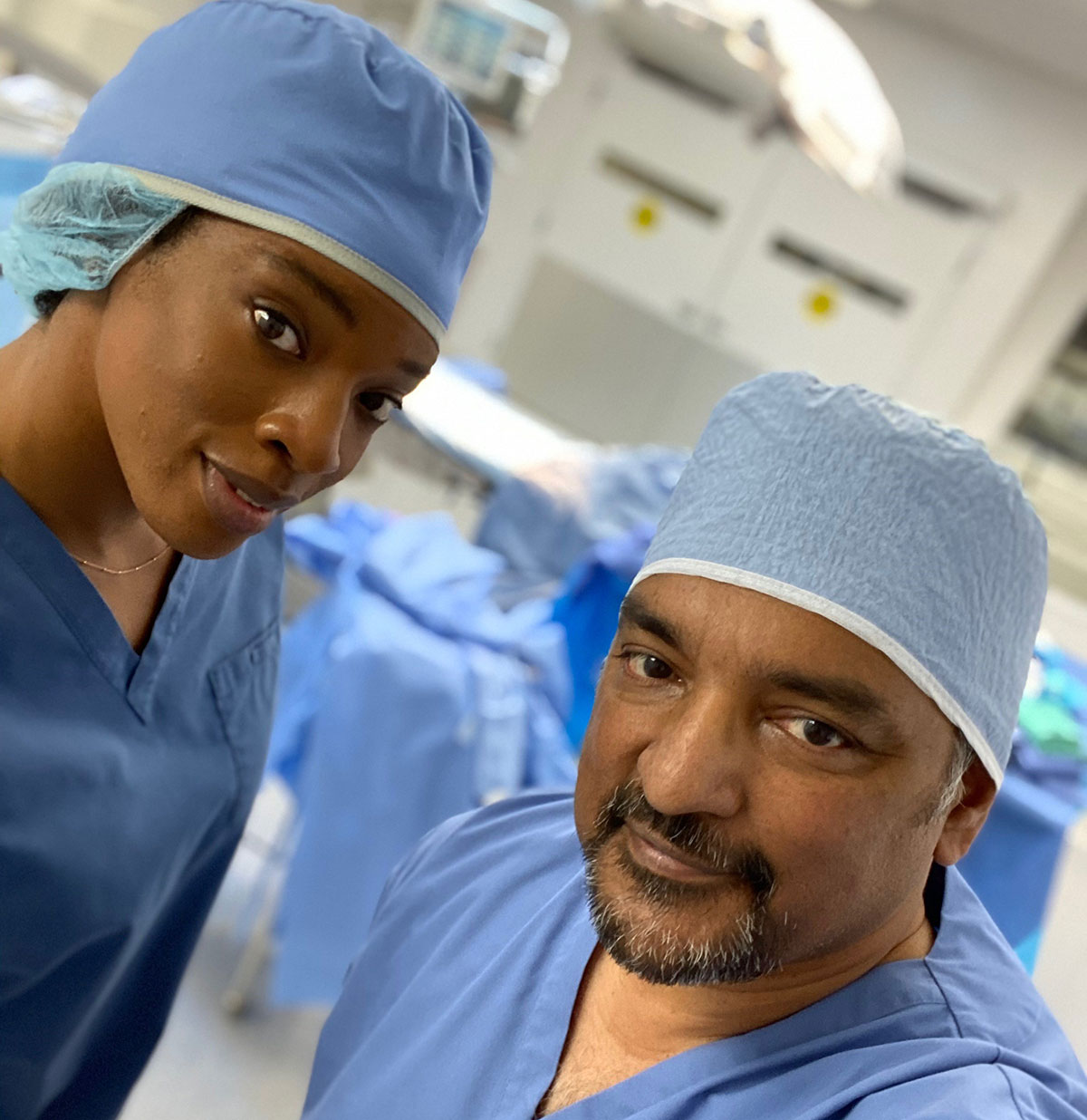
Sugith Varughese
This year I had the great fortune of being asked to join the cast of Transplant, a new medical procedural series for CTV and NBCU filming in Montreal, as the senior surgeon, Dr. Aajay Singh.
This is by far the biggest Canadian TV series I’ve been in and, what’s especially gratifying, is the cast is led by diverse performers, Hamza Haq playing Dr. Bashir “Bash” Hamed and Ayisha Issa who plays rookie trauma surgeon, Dr. June Curtis. Bash is a Syrian refugee who was a doctor in his home country and gets the chance to resume his career in emergency medicine at York Memorial, a Toronto teaching hospital, but must first redo his residency. It’s an ensemble drama that focuses on the cases, impeccably researched and medically accurate.
Recently, I sat down with Hamza and Ayisha to talk about working on Transplant and being diverse performers in Canada.
Sugith Varughese: Hamza, you’re number one on the call sheet for this show and Ayisha you’re number five. I’m happy to be number ten. And we’re not the only diverse cast members in Transplant. Do you know the significance of having actors of colour so high on the call sheet on a Canadian network television series?
Hamza Haq: I just know that I don’t think it happens nearly enough, so this is long overdue and a step in the right direction.
Ayisha Issa: I have to agree. It’s pretty awesome to be a part of a project like this, but at the same time it should be the norm.
It’s pretty awesome to be a part of a project like this, but at the same time it should be the norm.

Ayisha Issa. Photo: Yan Turcotte
HH: You’re the brown guy who’s been doing this [acting] since before there were brown people in Canada.
SV: (Laughs) I’m the OG [old guy]! I don’t know if I was the first, but I think I may be the longest ACTRA member of South Asian extraction.
HH: That’s crazy.
I grew up a brown kid in Saskatoon and I was the only one. When I finally saw a brown person on screen… it took my breath away.
SV: I grew up a brown kid in Saskatoon and I was the only one. When I finally saw a brown person on screen, it was an Indian film my parents took me to at the university when I was 11, it took my breath away. And I realized in that moment I had to work a lot harder to project myself into movies and TV shows than my friends did. I was invisible in my own culture and I didn’t want to be. But it was unfathomable to me that a brown actor could star in a Canadian TV series, Hamza. Did you think that, in 2019, this would be a possibility for you?
HH: It’s the kind of thing you dreamt about but didn’t really think it could happen. But I always had this kind of blind faith if I just keep doing it, good things would happen. And I was just happy to not be playing terrorists after 2016.
SV: What’s your acting background and how does it intersect with your personal background?
AI: I fell into acting. I was encouraged to be an artist or a performer of some sort. But, as I got older, I realized there was no ME ever on TV, at least here. So, I gave up on TV and became a theatre performer and a model, though not really conforming because I was also black and athletic. But then my modelling agent called me because they were looking to cast a big movie and started bringing anyone in. That’s how I landed my first acting gig.
After my first year of accounting, I had the best grades ever, but my parents are like, hey why aren’t you happy? And I told them I’d like to be an actor.
HH: I’m the youngest of four and so I always would do whatever I could to entertain the family, but when I went to Carlton to study neuroscience, I didn’t like it so I switched to accounting. After my first year of accounting, I had the best grades ever, but my parents were like, “hey why aren’t you happy?” I told them I’d like to be an actor. I’d seen The Fall by Tarsem Singh and I’m watching this movie and I’m like, that’s what I want to do. I want to tell stories. My dad said, sure, get a degree first, and then go all in. That summer, I started taking acting classes in Ottawa. When I graduated, I booked a ticket to Los Angeles and studied acting there and I’ve been doing it ever since.
SV: Hamza, you were in our showrunner Joseph Kay’s previous show This Life. Did that lead to Transplant?
HH: Yes, they’re absolutely connected. When I got cast in This Life, I was able to create the character with them. I submitted as many accents as I could in my self-tape. And after I was cast, I gave them things from my life they ended up using in the show. And then I got nominated for a Canadian Screen Award for This Life. Immediately after that I did The Indian Detective for CTV, so they knew me. And when Transplant got picked up, Joseph hired me as a character consultant for Bash along with other character consultants. He wanted to know what it’s like being an immigrant in Canada. So, when it came time to suggest actors, I guess I was the most obvious first choice.
AI: I, on the other hand, auditioned for another part before they cast me as June. And I want to step back and point out I don’t have this crazy long resume I see a lot of white actresses about my age with. I’ve gone through long spells where I just wasn’t auditioning. My boyfriend, who’s white, auditions two or three times a month and he just started acting a year ago. So, I almost feel like this could be gone tomorrow and this couldbe the last project I ever get to be this high on the call sheet.
SV: It’s like my mother says, you got to be twice as good to get half as far in this country. I say you have to be four times as good because we just don’t get the kick at the can as much. We have to punch above our fighting weight as a result.
HH: And I think a lot of people are looking for that magic formula. I’ve worked really hard for the past 20 years and then I got lucky.
There’s no way I’m going to leave here not being a better actor than when I got here.

Hamza Haq. Photo: Yan Turcotte
SV: Let’s go back to that first day on Transplant, Ayisha. You and I did the very first scene shot for the series, that big scene with all these background performers on this gigantic hospital set. When we shot that, what was going through your mind?
AI: I was trying to keep it together. I’m still trying to keep it together most of the time. Sometimes you just gotta keep your blinders on and just try to get through it. I remember that big day and being like, “don’t f*ck it up.”
SV: Twenty-five years of experience later, when I saw that set and the hundred extras and crew, I just went, “I’m home! Yeah, I’m home.”
I fell into acting. I was encouraged to be an artist or a performer of some sort. But, as I got older, I realized there was no ME ever on TV, at least here.
AI: That’s amazing. I want to blossom like that. They’ve given us really complex characters to play and all of this technical stuff to do and learn and there’s no way I’m going to leave here not being a better actor than when I got here. But it’s definitely a tremendous amount of pressure.
SV: Speaking of the technical stuff, we actually get trained in surgery to do the scenes in the operating room. Surgical staff teach us how to hold the instruments and retract and do suction. But, fundamentally, it’s still playing a character. What prep do you do?
HH: I shadowed our main medical consultant, Dr. Levine, at Montreal General. He’d snuck me in and said, “pretend you’re in first year.” And you know what? If this show completes three seasons, I might even write the MCAT and, if I pass, I’ll go. Or I’ll sponsor like five people who can’t afford to go, who knows? As soon as I officially booked the part, they were like, all right, you have to learn Arabic, you have to learn how to speak in a dialect, you have to lose 20 pounds and you have to be a really good actor. And I got a coach for all of those. I got a language coach, a dialect coach and a personal trainer and I’ve been training with the same acting coach since [I lived in] Los Angeles.

Ayisha Issa. Photo CTV
I’ve gone through long spells where I just wasn’t auditioning… I almost feel like this could be the last project I ever get to be this high on the call sheet.
SV: So how did you pick your acting coach?
HH: She chose me, you know? She’s in Toronto and, because I’ve been working with her for about 10 years, she’ll go through the script and ask, “what do you think is going to be a problem?” And we’ll go over that. And that enables me to be ready, playing with the directors as well.
SV: I find a lot of people have a misunderstanding of the actor-director relationship on a TV show. How little direction you get in terms of your particular performance – or rather how much responsibility you have for it.
AI: I recognize myself as being someone who gets a lot of direction. And it’s not because I don’t prepare.
Part of me tries to be director-proof just in case, and part of me is like a director-sponge.
SV: Well, we are all different with different needs. Part of me tries to be director-proof just in case, and part of me is like a director-sponge. They may spark something I hadn’t thought of. But my personal approach is my own, which comes from a lot of experience and a lot of confidence from that experience. Don’t tell anybody, but when I walk on set, I fundamentally believe everybody works for me, including the director. Everyone’s job is to help me be really good. And I don’t mean that in an egotistical way. It probably is, but I don’t mean it to be.
HH: I don’t think it’s egotistical. It’s arrogant, but that’s okay.
SV: Right. Right! It’s necessary to be arrogant, because you have to be. You’re the one in front of the camera.
HH: That’s why they’re watching. They don’t want to feel like you’re grateful. I AM grateful, for the work, but I’m giving YOU something. And I say this with as much humility as I can, but it’s the healthiest place for me to be as an actor.

Ayisha Issa and Sugith Varughese
SV: It’s like playing a game. Like a great tennis match. I need to hit the ball as hard as I can.
HH: Yeah, and it’s my job to hit the ball back to you even harder.
SV: Keeping in mind the readers of this are ACTRA members, what do you want to leave for them? As far as Transplant goes or as young actors on the move… you’re role models.
HH: I think it’s up to actors in Canada to raise the bar. If we keep accepting mediocre roles and mediocre stories, then they’ll keep writing them. Start being more honest about that.
AI: One of the things I learned about this business and being a person of colour is you need to set your life up in a way that allows you to be able to walk away from the work as well. Find something else you also like doing. It will help you grow as a person. My other life is Brazilian jujitsu. It helps me with life experience as well as making me a better actor.
My other life is Brazilian jujitsu. It helps me with life experience as well as making me a better actor.
SV: I would say, be an artist. Van Gogh wasn’t a successful artist, but he was a great one. You won’t necessarily have control over whether you’re going to be successful, but you can choose to be an artist. Who banks their money! (Laughs.)
HH: There’s a difference between work and having a gig. Some of my best gigs were not for money. Work with your friends on a co-op for free if you want. When you choose the work well, the money will take care of itself.
Transplant premieres February 26 on CTV.
RELATED STORIES
Transplant coming this Spring to CTV
Sugith Varughese has over 90 screen credits, including playing Mr. Mehta on CBC’s hit TV comedy Kim’s Convenience. He has appeared in numerous stage productions including Little Pretty and The Exceptional, which garnered him a Dora Award nomination. His film credits include The Joke Thief, Red Rover as well as Atom Egoyan’s Guest of Honour. He is an award-winning TV writer and short film director and was the first minority to attend the prestigious Canadian Film Centre as a writer-director.
Ayisha Issa plays Dr. June Curtis on the CTV medical drama Transplant and she has recurring roles on Dark Matter, 12 Monkeys and Workin’ Moms. In 2018, Ayisha won a Prix Gemeaux for her portrayal of Brittany Sizzla in the acclaimed French-Canadian series Unité9. Ayisha’s movie credits include Brick Mansions, The Hummingbird Project and Immortals. Her videogame work includes playing Fliss in Mad of Medan and Jayma in Far Cry Primal. Ayisha holds a Brazilian jujitsu Top Team Brown Belt for and won World Championships in 2014 as a Blue Belt.
Hamza Haq stars as Bashir ‘Bash’ Hamed in the new CTV medical drama Transplant. Additional television credits include the CTV mini-series Indian Detective, Quantico, Designated Survivor, The Bold Type, Being Human and the CBC Gem original dramaThe 410. In 2018, he earned a Canadian Screen Award nomination for Best Guest Performance for his portrayal of Raza Ali in the CBC drama This Life. On the big screen, Hamza has appeared in supporting roles in Flarsky, Bon Cop Bad Cop 2, mother!, The Death and Life of John F. Donovan, Run this Town and the soon-to-be released My Salinger Year starring Margaret Qualley and Sigourney Weaver.
Top Photo:
Jim Watson, Hamza Haq, Ayisha Issa, Laurence Leboeuf, in CTV’s Transplant. Photo by Yan Turcotte.
Share







